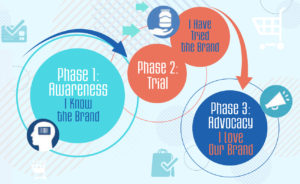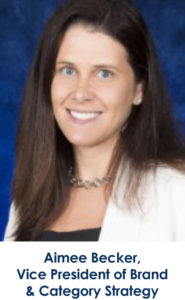
Building a Private Brand Advocacy Program
Today’s marketing environment is becoming increasingly cluttered, with experts estimating consumers are exposed to more than 3,000 marketing messages every single day. To help cut through the clutter, consumers are relying more on personal recommendations and word-of-mouth marketing when deciding what to buy. Retailers are in a prime position to tap into the power of such recommendations for their private brands right at the point of purchase. How so? By turning their store associates into brand advocates.
Front-line associates own the moment of the sale, and as such, are best positioned to provide recommendations that influence the consumer decision-making process. While turning associates into advocates may at first seem like a  significant investment in a workforce with traditionally high turnover, the return can be unmatched. Associate advocates can not only aid in building shopper trust and engagement with the retailer, but also impact the retailer’s revenue.
significant investment in a workforce with traditionally high turnover, the return can be unmatched. Associate advocates can not only aid in building shopper trust and engagement with the retailer, but also impact the retailer’s revenue.
Daymon helps retailers build successful private brand advocacy programs using a structured approach, which starts with clearly defined objectives (for example to increase awareness of the private brand program) and a simple method of measurement (such as sales lift or loyalty card data). Its method is built on a three-layered approach that’s flexible and customizable based on a retailer’s needs.
“Awareness is the foundation of any associate advocacy program,” says Aimee Becker, Vice President of Brand & Category Strategy for Daymon. “All employees should be aware of a retailer’s private brand program—and the importance of it to the overall success of the retailer.”
Becker notes that awareness efforts need not be particularly expensive or time-consuming. “A quick solve is to make this foundational stage part of an on-boarding program, which most retailers have in place already.” It can also include simple things like brand signage in the breakroom or more intensive classroom or online trainings, she suggests.
Building upon awareness, retailers can take advocacy to the next level by encouraging trial of private brand items by store employees. This can include strategies like offering samples of new and hero products to associates, sponsoring in-store taste tests, or sponsoring contests or coupons for private brand items. This helps take associates from “I’ve heard of it” to “I’ve tried it,” and builds trust that the brand delivers against consumer needs.
The next step is to elevate associates to the “I love it” level—helping them become true ambassadors and natural marketers of private brands. “To really execute this phase, it requires a cultural shift,” says Becker. “Advocacy starts at the top of the organization, and includes everyone from the CEO to the front-line associates believing in the brand.” Strategies to foster this level of advocacy can include using associate stories in promotional materials, highlighting their recommendations on the shelf, offering friends-and-family coupons and more.
“The best associate advocacy programs are the ones that leverage tactics holistically throughout each stage and drive consistent engagement with associates regardless of level, starting on day one,” says Becker. “Successful associate advocacy programs will help create a culture of pride in stores and in the organization overall. This culture will ultimately result in a positive return on investment, better brand equity and increased private brand sales for the retailer.”
To learn more about building an associate advocacy program for your brand, contact Vice President Aimee Becker at abecker@daymon.com.

